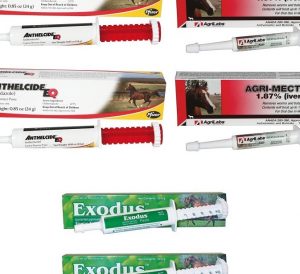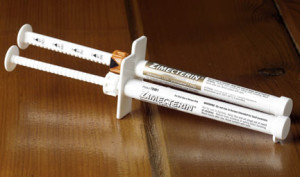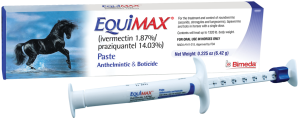 The days of deworming every other month are over. Or, at least, they should be.
The days of deworming every other month are over. Or, at least, they should be.
Research shows that you do more harm than good when you order that variety pack and stuff worming paste down your horse’s throat indiscriminately.
Why?
Most horses don’t need wormer and by giving it to them anyway, you lower their resistance and compromise the good bacteria.
On average, just one horse in a herd of four hosts the majority of parasites. That horse should be identified and treated accordingly.
Today’s body of evidence points to the importance of doing annual or spring/fall fecal egg counts to pinpoint the specific horse, the specific parasites, and direct treatment. It’s been called “Targeted Deworming.”
“The object of targeted worming is to cut way back on the amount of worm medicine being used and so lessen the ability of the parasites to develop immunity to it. It’s similar to human medicine where your doctor doesn’t want to give you antibiotics for every little infection,” writes renowned Maine vet Dr. Dave Jefferson.
 Think about it: We wouldn’t give our kids amoxicillin every January just cuz. It would be absurd and harmful. That kind of pointless medication would eventually render amoxicillin useless because over time, the bacteria would morph into new amoxicillin-resistent bacteria.
Think about it: We wouldn’t give our kids amoxicillin every January just cuz. It would be absurd and harmful. That kind of pointless medication would eventually render amoxicillin useless because over time, the bacteria would morph into new amoxicillin-resistent bacteria.
Jefferson and many vets interviewed recommend fecal egg counts performed once or twice a year. Many practices do them in house. Some even do them during a farm visit.
Even with the cost per sample (between $16-28), clients typically save money by not using wormers so often. And the horses are healthier for it.
Of course, there’s the added bonus of knowing exactly which horse has parasites and which parasites need targeting.
- More information.
- Less blind treatment.
Additional Note:
Some vets recommend once-a-year worming for tape worms and/or bot fly eggs. (One typically sees bot fly eggs on horses’ legs). The most effective wormers in these cases are Zimecterin Gold and Equimax as they contain a combination of the drugs ivermectin and praziquantel.

After a through review of the research in this area and discussion with numerous vets, I have followed this procedure for years with great results. fecal egg counts have been low in all my horses and I can be confident that I am not contributing to the development of their immunity to these agents. I remember my initial amazement on learning that it was usually the horses treated with the regular dosing with various wormers who carried the largest parasite burden because they had developed immunity.
The problem with fecal egg counts is they can’t pick up encysted strongyles. Additionally a horse can look and act fine and yet still be carrying a high load of encysted strongyles. It is also my understanding that parasites shed at different times, so unless you do fecals often, your horse may have a higher load of parasites, but his stool may not have many eggs when you test. This makes it very difficult to tell whether to worm or not based on fecal results. I understand, but have not done this, that it is not difficult to do your own fecals if you have a good microscope.
I’ve been going with this model for quite some time as it just makes sense. Just want to add after seeing the price to run a fecal, that if one has multiple animals a composite sample, taking a bit of each animal’s manure to create one sample will tell you what you need to know.
Do NOT mix manure samples of multiple horses together. This make the test results worthless.
The point of testing a horse is to see the egg count of THAT HORSE and only deworming enough to treat those with high egg counts. If you mix samples together, you have no way of knowing which horse was shedding and which wasn’t. You’re throwing your money away.
Thanks for these great comments. Just a word about Aw Firestone’s comment. A composite sample is NOT effective. Research shows that one horse may be drastically different than others in terms of hosting parasites. He will not look any different, but his individual fecal sample will reveal that he hosts the majority of parasites while his herdmates may have next to none. Individual fecal samples are crucial.
Good in theory but it doesn’t for for all stables. To do this, you’d need to do fecal egg counts on all the horses periodically. Some people can’t afford the $25-30 per horse our local vets charge per horse (plus dewormer for the highest egg burden horses)… vs $2 a tube per horse to worm the entire herd with generic ivermectin. For 10 horses that’s $300 + dewormer costs… versus $20 total. Ouch!
I know in a perfect world money wouldn’t be a priority. But as long as vets charge so much to test it, the expense closes some people out.
Also, in barns where horses are always going in and out to/from other places, a horse may not be there long enough to do 1-2 egg counts on and to see where his egg counts are. What do you do with that horse in the meantime, as he may or may not be shedding things into shared pastures?
Combine the two, and you might see why it wouldn’t work for example at busy boarding barns where owners aren’t keen on $30/horse/test fees, where horses only stay a few months, and where old & new horses are always sharing pastures.
All I’m saying is that how horses are managed depends on the individual situation. There is no right answer that works for every horse owner & ever horse. The plan needs to be tailored to the situation.
Cannot afford $30 for a fecal exam?? Then how do these horse owners afford shipping, showing, lessoning, etc? Times are changing, there are going to be camps of people generally unwilling to learn new ways and adopt new schools of thought, but if you actually think about this method it is really for the better of us all and your horses. Rotational deworming practices bank on using a dewormer once every two months. So at the least that’s $2/month and you’re deworming blind – you have no idea what you’re treating for. If you continue to do this, problems are bound to arise if you have a horse with a high burden.
If you have the type of attitud that you think it is the vet that is trying to win your money over promoting best practices then you shouldn’t be owning animals. Your vet should be someone you rely on to keep your animals healthy, right? So why the distrust in their motives? I’m sure you’d be calling them right quick if your horse started colicking. Trust comes in one flavor, all or none.
If they can’t afford the cost of a fecal, how are they going to care for their horse if it ends up with resistant parasites that the routine wormers will no longer take care of?
I made the mistake with my first horse, of worming only if fecal counts indicated wormer was needed. Of course threadworms never showed up, nor encysted strongles.. The poor horses was miserable and would not stop rubbing his neck. He had scabs every where from constant rubbing. It took me forever to make the connection and he never got over it.
Follow the money. There’s more money for vets in fecal testing than in owners doing their own deworming.
Yes, follow the money – the pharmaceutical companies that make wormers, vaccines, the vets that set up programs that require all this intervention. Fecals can be done pretty easily if you share an inexpensive microscope with fellow horse owners.
Mail In Fecal Sample Counts are cheap and easy! Just google them and pay attention to what they are testing and what kind of results and support they offer. Most give folks good discounts for quantities.
This is a FAR BETTER practice than injecting your horse with a drug that will only encourage parasitic resistance – that spells trouble for all horses, not just the ones you’re worming!
I have been following this practice for years but was warned this year by 2 vets that since it is impossible to see tape worms in the fecal count samples, that it is still a good idea to worm for tapes once a year.
Is it a good idea to give my horse probiotics after worming? And if so, when?
Good questions, Juana. We’ll get back to you!
We heard from Dr. Jeff Warren regarding the question of whether to give probiotics after worming. Since wormers are not anti-biotics, they are not killing bacteria. Therefore, probiotics are not necessary. “It’s apples and oranges,” said Warren. However, it might be advisable to give probiotics after a course of antibiotics, especially those administered orally, like SMZ (Sulfamethoxazole). Hope this helps!
Thanks so much, Maddy!
WOW, some of the comments are amazing considering how these poisons can affect their horses, showing up in all kinds of things they probably overlook. I also just read an article about how it is wise to keep your horses off their pastures for 48-72 hours after worming so not to harm Dung Beetles & other important fauna. We need to take care of nature instead of just doing what is most convenient for us humans. Nature has a pretty perfect plan if man didn’t interfere, like hooves and teeth too, but don’t get me started there=P
“Calico” pretty much nailed it. These situations are dependent upon context and my complaint is that broad based recommendations without providing relevant context actually create a disservice.
Case in point. Years ago vet students at Cornell did an experiment where they infused sand into the digestive tracts of a few horses and determined that the results from horses given psyllium mucilloid were no different than the control horses. Conclusion, psyllium was not helpful. I wrote the staff who ultimately agreed that the experiment had little relevance to the real world and those real veterinary findings where horses consumed small quantities of sand or dust over time and could not pass that material without some “assistance.” The disservice came in the result that a number of horse owners believed the experiment to be relevant to the real world and acted accordingly. There are a lot of people out there who look for excuses to not address issues responsibly.
I don’t advocate unnecessarily administering chemicals to any animals, however there are risk versus benefit balance points that differ according to environmental conditions, exposures, and even individual animals. Parasite loads are problematic and in some instances can become serious. Of course deworming needs to be done correctly as a poor program can in rare cases produce resistant strains of parasites.
Here’s a contemporary human parallel. Don’t inject those COVID-19 vaccine chemicals in your body. Just go take a COVID test. We can see how well that approach has worked for a lot of people.
We should all agree that excessive use of chemicals and biologicals is not a good idea, but let’s get real here. We need to understand our particular risk factors, what parasites are predominant, how they spread (e.g., flies vs. fecal transfer) and employ anthelmic protocols that target the actual threats.